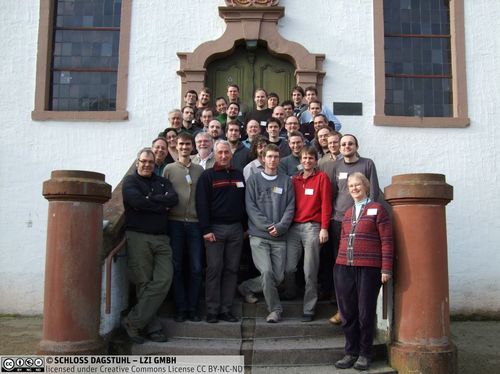Dagstuhl Seminar 09051
Knowledge representation for intelligent music processing
( Jan 25 – Jan 30, 2009 )
Permalink
Organizers
- Eleanor Selfridge-Field (Stanford University, US)
- Frans Wiering (Utrecht University, NL)
- Geraint A. Wiggins (University of London/Goldsmiths, GB)
Contact
Press/News
Press Reviews
-
Wo Informatiker in Klausur gehen - Sinnsuche im Saarland
Bericht von Sebastian Balzter, Frankfurter Allgemeine Zeitung 28.02.09 -
Wie digitale Musik besser interpretiert werden kann.
Wolfgang Back und Wolfgang Rudolph vom Computerclub Zwei im Gespräch mit Dr. Jörg Garbers und Prof. Frans Wiering.
The ubiquity and importance of music have made it an obvious candidate for applications of new technology throughout history, but most notably since the late 19th Century, when analogue electronics and then digital computers were brought to bear. There was initially an emphasis on the production of audible sound, but as computers became powerful, they were used in the generation of scores, and in recent years digital technology has approached the difficult problem of the understanding of music, both as what is heard and what is imagined.
This seminar aims to promote the computational study of music at levels of abstraction higher than the audio waveform. Doing so will enable automation of the kind of reasoning applied explicitly by music composers, analysts, researchers and performers as consciously-developed skills, and implicitly by informed listeners as high-level cognitive processes.
Many music encoding systems have been created since the 1960s, and large quantities symbolic musical data have been produced across the world, as the output of disparate projects, and represented for storage in ways which are not interoperable. Music knowledge representation research, as opposed to musical data encoding, emerged in the 1970s. Only after several decades of research, consensus on generally appropriate features for music representation was reached, and approaches—for example MEI, MusicXML, and MPEG7 Notation—have been developed which do model music more fully. Only recently, attempts have been made to represent music in ways which conform to the principles of Knowledge Representation, in that their specifications explicitly include inference systems. The inference aspect is fundamentally important: a computer encoding of data is meaningless without a method for interpreting it.
An important area of application is in digital critical editions of music. Whereas paper editions have the drawback of presenting a selective and static image of a composition, digital editions potentially provide a more complete representation of the source materials and allow different ‘views’ of these to be generated automatically. Suitable knowledge representations for these sources would allow inference of missing information that is considered essential for modern study and performance, such as accidental pitch changes in Renaissance music, voice leading in lute tablatures, realisation of implied chords in basso continuo accompaniment, and also suggest solutions for unclear, illegible, corrupted and lost passages. Finally they would allow the compositions to be processed by means of a wide range of music-analytical or music retrieval methods.
- Antonis Alexakis (University of Athens, GR)
- Christina Anagnostopoulou (Univ. of Athens, GR)
- Donald Byrd (Indiana University - Bloomington, US)
- Tim Crawford (University of London/Goldsmiths, GB)
- Bas De Haas (Utrecht University, NL)
- Theodor Dumitrescu (Utrecht University, NL)
- Sebastian Ewert (Universität Bonn, DE) [dblp]
- Jamie Forth (University of London/Goldsmiths, GB)
- Christian Fremerey (Universität Bonn, DE)
- Jörg Garbers (Utrecht University, NL)
- Bruno Gingras (University of London/Goldsmiths, GB)
- Peter Grosche (MPI für Informatik - Saarbrücken, DE)
- Zoltan Juhasz (KFKI Research Institute - Budapest, HU)
- Johannes Kepper (EDIROM - Detmold, DE)
- Ian Knopke (University of London/Goldsmiths, GB)
- Andreas Kornstädt (Stanford University, US)
- Olivier Lartillot (University of Jyväskylä, FI)
- Kjell Lemström (University of Helsinki, FI)
- David Lewis (University of London/Goldsmiths, GB)
- Richard Lewis (University of London/Goldsmiths, GB)
- Alan Marsden (Lancaster University, GB)
- Dougie McGilvray (Glasgow Caledonian University, GB)
- David Meredith (Aalborg University, DK)
- Daniel Müllensiefen (University of London/Goldsmiths, GB)
- Meinard Müller (MPI für Informatik - Saarbrücken, DE) [dblp]
- Laurent Pugin (Stanford University, US)
- Christophe Rhodes (University of London, GB)
- Martin Rohrmeier (University of Cambridge, GB) [dblp]
- Perry Roland (University of Virginia, US)
- Daniel Röwenstrunk (EDIROM - Detmold, DE)
- Eleanor Selfridge-Field (Stanford University, US)
- Janos Sipos (Hungarian Academy of Sciences - Budapest, HU)
- Peter Van Kranenburg (Utrecht University, NL)
- Joachim Veit (EDIROM - Detmold, DE)
- Raffaele Viglianti (King's College - London, GB)
- Frans Wiering (Utrecht University, NL)
- Geraint A. Wiggins (University of London/Goldsmiths, GB) [dblp]
Classification
- artificial intelligence
- robotics
- semantics
- specification
- formal methods
- Interdisciplinary: musicology
- cognitive modelling
Keywords
- knowledge representation
- inference
- music
- musical data
- information retrieval
- music analysis
- digital editing of music
- music cognition
- computational musicology.


